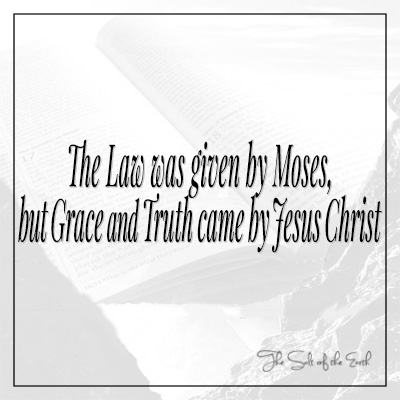What about grace and works? Are you saved by grace or are you saved by works? Do you live under grace or do you live under the law? Is it all grace and are works not relevant anymore or do works matter? What does the Bible say about grace and works?
Where did the law originate from?
The law of the Lord is perfect, converting the soul: the testimony of the Lord is sure, making wise the simple. The statutes of the Lord are right, rejoicing the heart: the commandment of the Lord is pure, enlightening the eyes (Lipesaleme 19:7-8)
It’s important to look at where the law originates from and for whom the law was intended. The law originates from God’s nature and His will. By giving the law to Moses, God revealed His nature and His will to His carnal people Israel. Ka hona, the moral part of the law, through which sin is revealed, represents the will of God.
God’s people had lived for 430 years in pagan Egypt and were accustomed to the Egyptian culture and religion (Exodus 12:40).
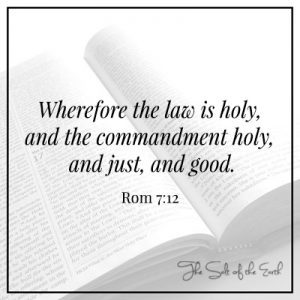 After God had redeemed His people from the power of Pharaoh and from their slavery in Egypt and led His people to the promised land, God’s people had to be cleansed and be renewed in their minds, so that they would not think like the Gentiles, who didn’t acknowledge and served God but acknowledged and served other gods, but that they would live as children of God and acknowledge God as their God and Creator of the heaven and the earth and all there is within and would serve Him and walk in obedience in His will.
After God had redeemed His people from the power of Pharaoh and from their slavery in Egypt and led His people to the promised land, God’s people had to be cleansed and be renewed in their minds, so that they would not think like the Gentiles, who didn’t acknowledge and served God but acknowledged and served other gods, but that they would live as children of God and acknowledge God as their God and Creator of the heaven and the earth and all there is within and would serve Him and walk in obedience in His will.
God’s people would possess a land, where Gentiles lived. God didn’t want His people to get involved with the Gentile cultures, religions, borapeli ba litšoantšo, meetlo, and customs, but would separate themselves from the other Gentile nations and keep the commandments and precepts of God and live holy.
God made His will known by giving His commandments, whereby God’s people could renew their way of thinking, so that their minds would be conformed to the will of God and they would know His thoughts and walk in His ways (Bala hape: ‘Are God’s thoughts our thoughts?‘ le ‘Is God’s way your way?‘).
And so God’s people were saved by grace and would stay saved by keeping the commandments, which represented God’s will.
For whom was the law intended?
The law, which God had given and originated from His nature and His will, was intended for His carnal people Israel, ba tswetsweng lelokong la Jakobo (Iseraele).
Israel was a carnal people, who belonged, just like the other nations, to the generation of fallen man; monnamoholo, who is soulish and only can live after the flesh.
Ka hona, the law pertained to fallen man, who was put below the devil and his angels and lived under the rulership of the devil, sebe, le lefu, because of the fall (disobedience to the words of God and obedience to the words of the devil).
All the commandments, ditaelo, feasts, meetlo, melao ea lijo, and sacrificial laws were meant for the carnal man, who was trapped in the flesh and whose spirit was dead and had to be kept, so that through obedience to the words of God and by keeping His commandments and precepts God could have a relationship with His carnal people.
Leha ho le joalo, the natural birth of God’s people didn’t give them a privileged position in regard to (eternal) salvation and didn’t exonerate them if they decided to go their own way and violate the law and become disobedient to the words of God, which are written in God’s law and represent His will (Bala hape: ‘The secret of the law‘).
The violation of the law and the punishment
Batho ba bangata, who belonged to God’s people through natural birth were punished and sentenced to death because of their violation of the law; their disobedience to God and His Word.
God knew the old man and the weakness of the flesh and since man was not spiritual but lived under the power of sin and death, God had to deal according to the state of fallen man and carry out punishments in order to prevent the rest of God’s carnal people would be affected and/or influenced by the evil; sebe (ho se mamele Molimo) and practice the same evil.
Through the grace of God, through natural birth, God’s people were saved and belonged to Him and because of their fear and love for God, which was expressed by keeping the law, God’s people stayed saved and lived on the mount of blessing.
No flesh can be justified by the works of the law
Now we know that what things soever the law saith, it saith to them who are under the law: that every mouth may be stopped, and all the world may become guilty before God. Therefore by the deeds of the law there shall no flesh be justified in his sight: for by the law is the knowledge of sin. But now the righteousness of God without the law is manifested, being witnessed by the law and the prophets; Even the righteousness of God which is by faith of Jesus Christ unto all and upon all them that believe: for there is no difference: For all have sinned, and come short of the glory of God; Being justified freely by His grace through the redemption that is in Christ Jesus: Whom God hath set forth to be a propitiation through faith in His blood, to declare His righteousness for the remission of sins that are past, through the forbearance of God; To declare, ke rialo, at this time His righteousness: that He might be just, and the justifier of him which believeth in Jesus (Baroma 3:19-26)
We who are Jews by nature, and not sinners of the Gentiles, Knowing that a man is not justified by the works of the law, but by the faith of Jesus Christ, even we have believed in Jesus Christ, that we might be justified by the faith of Christ, and not by the works of the law: for by the works of the law shall no flesh be justified. But if, while we seek to be justified by Christ, we ourselves also are found sinners, is therefore Christ the minister of sin? Molimo ha ho joalo. For if I build again the things which I destroyed, I make myself a transgressor. For I through the law am dead to the law, that I might live unto God. I am crucified with Christ: nevertheless I live; leha ho le joalo eseng 'na, but Christ liveth in me: and the life which I now live in the flesh I live by the faith of the Son of God, who loved me, and gave Himself for me. I do not frustrate the grace of God: for if righteousness come by the law, then Christ is dead in vain (Bagalata 2:15-21)
The obedience of the law and the works of the law couldn’t change anything about the (tsa moya) state and position of fallen man. The spirit of man remained dead, despite the keeping of the law and the works of the law.
Despite the keeping of the law, the carnal man remained living in the bondage of the devil, sebe, le lefu, through the flesh.
The sacrifices and the blood of animals couldn’t change anything about it. The blood of animals could only make temporary atonement for the sins and iniquities of fallen man.
As long as the flesh, in which sin and death reign, would exist, the people would be bound by the law.
The coming of the promise, Jesu Kreste
For I came down from heaven, not to do Mine own will, but the will of Him that sent Me. And this is the Father’s will which hath sent Me, that of all which He hath given Me I should lose nothing, but should raise it up again at the last day. And this is the will of Him that sent Me, that every one which seeth the Son, and believeth on Him, may have everlasting life: and I will raise him up at the last day (Johanne 6:38-40)
But God sent His Son to the earth to change the state of fallen man. By the coming of God’s promise; the coming of the Messiah, God’s people would be redeemed from the spiritual authority of the devil and sin and death, which reigns in the flesh.
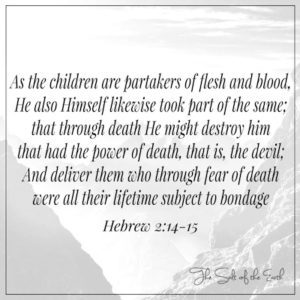 God would redeem His people from the kingdom of darkness and transfer them into His Kingdom and restore the state of fallen man and the relationship between God and man, which was broken through sin (ho se mamele Molimo).
God would redeem His people from the kingdom of darkness and transfer them into His Kingdom and restore the state of fallen man and the relationship between God and man, which was broken through sin (ho se mamele Molimo).
And so Jesus Christ, Lentswe le phelang, and Son of God came to the earth and took the place of fallen man and carried the sins and the punishment for sin, which is death, upon Himself and reconciled man back to God by His blood.
Jesus was sacrificed as a Lamb and carried the sins and iniquities of fallen man, which the Father laid upon Him, and died on the cross.
Jesus was made sin and because of that, Jesus entered Hades. Leha ho le joalo, God’s power was stronger than the death, and so after three days, Jesus rose as Victor from the dead with the keys of hell and death.
Jesus became the Way to salvation and reconciliation with the Father, first of all for God’s carnal people.
The coming of the promise, Moya o Halalelang
And I will give them one heart, and I will put a new spirit within you; and I will take the stony heart out of their flesh, and will give them an heart of flesh: That they may walk in My statutes, and keep Mine ordinances, and do them: and they shall be My people, and I will be their God. But as for them whose heart walketh after the heart of their detestable things and their abominations, I will recompense their way upon their own heads, Ho bolela Morena Jehova (Ezekiel 11:19-21).
If ye love Me, keep My commandments. And I will pray the Father, and He shall give you another Comforter, that He may abide with you for ever; Even the Spirit of truth; whom the world cannot receive, because it seeth him not, neither knoweth Him: but ye know Him; for He dwelleth with you, and shall be in you (Johanne 14:15-17)
Giving thanks unto the Father, which hath made us meet to be partakers of the inheritance of the saints in light: Who hath delivered us from the power of darkness, and hath translated us into the kingdom of His dear Son: In Whom we have redemption through His blood, even the forgiveness of sins (Bakolose 1:13)
Because on the Day of Pentecost, when the other Comforter, the Holy Spirit was sent by the Father, due to the finished work of Jesus Christ, the disciples of Jesus Christ received the Holy Spirit, and their spirits were raised from the dead and they were redeemed from the power of the devil and transferred from the kingdom of darkness into the Kingdom of God, moo Jesu Kreste e leng Morena le ho busa.
At that moment, they not only belonged through their natural birth to God, but through the spiritual new birth, they were reconciled with God and belonged to Him and had become the new creation; bara ba Modimo (males and females).
They were born under the law, but by faith and regeneration in Christ, they were redeemed from the law of sin and death and the curse.
God’s will written in the heart of the new man
Bonang, the days come, saith the Lord, when I will make a new covenant with the house of Israel and with the house of Judah: Not according to the covenant that I made with their fathers in the day when I took them by the hand to lead them out of the land of Egypt; because they continued not in My covenant, and I regarded them not, saith the Lord. For this is the covenant that I will make with the house of Israel after those days, saith the Lord; I will put My laws into their mind, and write them in their hearts: and I will be to them a God, and they shall be to Me a people: And they shall not teach every man his neighbour, and every man his brother, ho bua, Know the Lord: for all shall know Me, from the least to the greatest. For I will be merciful to their unrighteousness, and their sins and their iniquities will I remember no more. In that He saith, A new covenant, He hath made the first old. Now that which decayeth and waxeth old is ready to vanish away (Hebrews 8:8-13)
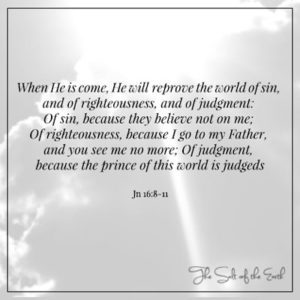 They were no longer the old creation, who belonged to the world; mmuso wa lefifi, and were directed and led by the sinful nature, which is present in the flesh, and its lusts and desires.
They were no longer the old creation, who belonged to the world; mmuso wa lefifi, and were directed and led by the sinful nature, which is present in the flesh, and its lusts and desires.
They didn’t need the written law of Moses anymore, in order to walk in the will of God and they didn’t have to keep the sacrificial laws and all the rituals of the law to live righteously and atone the sins and iniquities of the flesh.
Because through regeneration in Christ, they had crucified their flesh, whereby they were redeemed from the law of sin and death, which was intended for (the flesh of) motho wa nama.
Through the redemption of the flesh and the resurrection of the spirit from the dead, they had become sons of God, who were spiritual and had received God’s nature.
Because of the abiding of the Holy Spirit in them, they didn’t need the written laws of God anymore, to walk in His will, because God had put His laws in their minds and had written them in their hearts.
Because of their fear and love for God, they would walk after the Spirit and do God’s will on earth, joalo ka Jesu, Who walked after the Spirit and fulfilled the law of God.
The grace of God came to God’s carnal people; the children of Israël
We who are Jews by nature, and not sinners of the Gentiles, Knowing that a man is not justified by the works of the law, but by the faith of Jesus Christ, even we have believed in Jesus Christ, that we might be justified by the faith of Christ, and not by the works of the law: for by the works of the law shall no flesh be justified. But if, while we seek to be justified by Christ, we ourselves also are found sinners, is therefore Christ the minister of sin? Molimo ha ho joalo. For if I build again the things which I destroyed, I make myself a transgressor. For I through the law am dead to the law, that I might live unto God. I am crucified with Christ: nevertheless I live; leha ho le joalo eseng 'na, but Christ liveth in me: and the life which I now live in the flesh I live by the faith of the Son of God, who loved me, and gave Himself for me. I do not frustrate the grace of God: for if righteousness come by the law, then Christ is dead in vain (Bagalata 2:15-21)
For as many as are of the works of the law are under the curse: for it is written, Cursed is every one that continueth not in all things which are written in the book of the law to do them. But that no man is justified by the law in the sight of God, it is evident: for, The just shall live by faith. And the law is not of faith: empa, The man that doeth them shall live in them (Bagalata 3:10-12)
Tseo, who belonged to God’s carnal people and repented by faith in Jesus Christ and became born again, were saved and redeemed from the power of the devil, through the death of the flesh, and through the resurrection of the spirit from the dead, by the power of the Holy Spirit, became sons of God and entered the Kingdom of God.
They didn’t receive their salvation and their new position as sons of God in Christ by their own works, by doing the works of the law, but they received their salvation by their faith in Jesus Christ; Mora Modimo, and His redemptive work and blood.
Mohau wa Modimo came to the Gentiles
For this cause I Paul, the prisoner of Jesus Christ for you Gentiles, If ye have heard of the dispensation of the grace of God which is given me to you-ward: How that by revelation He made known unto me the mystery; (as I wrote afore in few words, Whereby, when ye read, ye may understand my knowledge in the mystery of Christ) Which in other ages was not made known unto the sons of men, as it is now revealed unto his holy apostles and prophets by the Spirit; That the Gentiles should be fellowheirs, and of the same body, and partakers of His promise in Christ by the gospel: Whereof I was made a minister, according to the gift of the grace of God given unto me by the effectual working of his power (Baefese 3:1-7)
The grace and salvation of God and the deliverance of the law, which works in the flesh, came first for His carnal people. Leha ho le joalo, through their rejection and fall, salvation came unto the Gentiles, whereby the Gentiles were given the opportunity, just like the people of Israel, to be saved and reconciled with God by faith in Jesus Christ and regeneration in Him and to become a son of God (male and female (Baroma 11:11, 15)).
Saved by the grace of God
I do not frustrate the grace of God: for if righteousness come by the law, then Christ is dead in vain (Bagalata 2:21)
The works of man and obedience to the law of Moses; the law of sin and death and keeping all the commandments, meetlo, feasts, melao ea lijo, and sacrificial laws can’t save man and redeem man from his fallen state and can’t make the spirit of man alive. The only way to salvation and to be redeemed from the sinful nature, which is present in the flesh is by dying to the flesh (Bala hape: Mokhoa o bohloko o tsejoang e le ho shoa le Following Jesus will cost you everything).
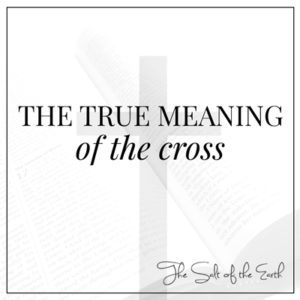 Ka hona, A person can only be saved, redeemed, and justified by Jesus Christ and His blood.
Ka hona, A person can only be saved, redeemed, and justified by Jesus Christ and His blood.
Only by faith in Jesus Christ and acknowledging His work and regeneration in Him, a person can be saved and be redeemed from the power of the devil, through the death of the flesh, and through the resurrection of the spirit from the dead, by the power of the Holy Spirit, be transferred from the kingdom of darkness into the Kingdom of God and be made holy and righteous by His blood.
You can’t receive the Holy Spirit by your works, you can only receive the Holy Spirit by faith in Jesus Christ (Bagalata 3:2)
When a person is born again and is made alive and becomes a new creation, who has God’s nature and in whom the Holy Spirit dwells, the will of God is written in the heart of the new man. Therefore the new man shall walk after the will of God and live in His will and do righteous works, according to the law of the Spirit.
By walking by faith after the Spirit, the new man shall fulfill the law, joalo ka Jesu, Who didn’t walk after the flesh but walked by faith after the Spirit and fulfilled the law of God.
Jesus didn’t come to destroy the law but to fulfill the law
Let your light so shine before men, that they may see your good works, and glorify your Father which is in heaven. Think not that I am come to destroy the law, or the prophets: I am not come to destroy, but to fulfill. For verily I say unto you, Till heaven and earth pass, one jot or one tittle shall in no wise pass from the law, till all be fulfilled (Mattheu 5:16-18)
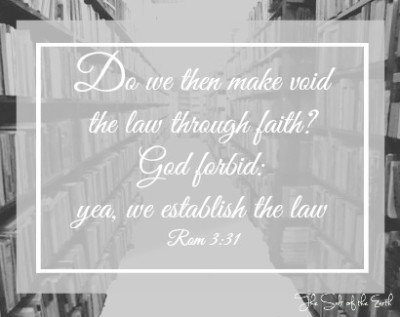 Jesus Christ didn’t come to destroy the law but to fulfill the law. Jesus showed that by the fear and love He had for His Father, He was able to keep all the commandments of the Father and do His righteous works.
Jesus Christ didn’t come to destroy the law but to fulfill the law. Jesus showed that by the fear and love He had for His Father, He was able to keep all the commandments of the Father and do His righteous works.
Ka baka leo, ha ho sa le tsuo ho ba leng ho Kreste Jesu, ba sa tsamayeng ka nama, empa kamora Moya. Hobane molao wa Moya wa bophelo o ho Kreste Jesu, o nkgolotse molaong wa sebe le lefu. Bakeng sa seo molao o neng o ke ke oa se etsa, ka hore e ne e fokola ka nama, Molimo o ile a romela Mora oa hae ka sebōpeho sa nama ea boetsalibe, le bakeng sa sebe, a ahlotse sebe nameng: Hore ho loka ha molao ho tle ho phethehe ho rona, ba sa tsamayeng ka nama, empa kamora Moya (Baroma 8:1-4)
The old creation, who walks after the flesh, is selfish and is led by his senses, maikutlo, maikutlo, and will and shall not be able to fulfill the moral part of the law. But the new creation, who has crucified the flesh and has become spiritual and walks after the Spirit, shall fulfill the moral part of the law, joalo ka Jesu (Bala hape: Is man able to fulfill the law?')
The works testified of Jesus Christ
But I have greater witness than that of John: for the works which the Father hath given Me to finish, the same works that I do, bear witness of Me, that the Father hath sent Me. And the Father Himself, which hath sent Me, hath borne witness of Me. Ye have neither heard His voice at any time, nor seen His shape (Johanne 5:36-37)
I must work the works of Him that sent Me, while it is day: the night cometh, when no man can work (Johanne 9:4)
 Jesus answered them, I told you, and ye believed not: the works that I do in my Father’s name, they bear witness of me. But ye believe not, because ye are not of my sheep, as I said unto you (Johanne 10:25-26)
Jesus answered them, I told you, and ye believed not: the works that I do in my Father’s name, they bear witness of me. But ye believe not, because ye are not of my sheep, as I said unto you (Johanne 10:25-26)
If I do not the works of My Father, believe Me not. But if I do, though ye believe not Me, believe the works: that ye may know, and believe, that the Father is in Me, and I in Him (Johanne 10:37-38)
Jesus did the will of the Father and His works testified, that Jesus was (and is) the Son of God and that the Father had sent Him to the earth.
Just like the works of many (religious) leaders testified that they were sons of the devil and that they did the will of their father the devil (Johanne 8:44)
And so everyone shall do the works of the one to whom he or she belongs to. Ka lebaka la seo, the works testify of a person to whom he or she belongs (Bala hape: ‘Thato ea Molimo vs thato ea diabolosi‘ le ‘Whose slave are you?‘)
The works testify if you are a son of God
Whosoever believeth that Jesus is the Christ is born of God: and every one that loveth Him that begat loveth him also that is begotten of Him. By this we know that we love the children of God, when we love God, mme o boloke ditaelo tsa Hae. For this is the love of God, that we keep His commandments: and His commandments are not grievous. For whatsoever is born of God overcometh the world: and this is the victory that overcometh the world, even our faith (1 Johanne 5:1-4)
Marvel not at this: for the hour is coming, in the which all that are in the graves shall hear His voice, And shall come forth; they that have done good, unto the resurrection of life; and they that have done evil, unto the resurrection of damnation (Johanne 5:28-29)
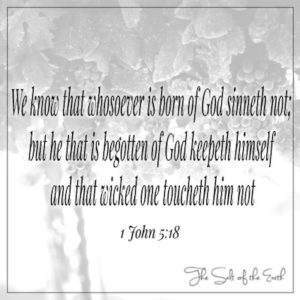 By grace, you are saved and by faith and regeneration, you have entered the Kingdom of God and become a son of God.
By grace, you are saved and by faith and regeneration, you have entered the Kingdom of God and become a son of God.
Now that you have become a son of God and are no longer a son of the devil, you shall live as a son of God by grace after the Spirit and not as a son of the devil after the flesh in sins and iniquities. Because through regeneration your flesh has died in Christ.
For sin shall not have dominion over you: for ye are not under the law, but under grace (Baroma 6:14)
They profess that they know God; but in works they deny Him, being abominable, and disobedient, and unto every good work reprobate. (Titus 1:16)
Everyone can say that he or she is born again and knows God, but a son of God doesn’t walk after the flesh, empa kamora Moya, and therefore a son of God shall not be rebellious, get involved with idolatry, and witchcraft, commit adultery (tlhalo), bohlola, ditshila tsa thobalano, and shall not lie, covet, be greedy for money, defraud, steal, kill, etc.
Lentswe le re, that the unrighteous, who do these carnal works, which derive from the flesh, don’t belong to God and shall not inherit the Kingdom of God (Oh. 1 Korinthe 6:10-11, Bagalata 5:19-21, 1 Johanne 5:18)
Qetellong, everyone shall be judged according to his or her works by the Word. This means that the works you do will determine your salvation (Oh. Johanne 12:48, 2 Korinthe 11:15, Tšenolo 20:12-13; 22:12).
The relation between grace and works is, that by grace you are saved and by your works you stay saved
The relation between grace and works is, that by the grace of God, you are saved and you no longer live, through the flesh, under the law but under grace. Leha ho le joalo, the works you do from your restored (fodile) state as the new man and your new nature, prove if you are born of God and belong to Him and stay saved or not. Because not everyone, who is saved keeps their salvation (Bafilipi 2:12-13, Hebrews 3:6-19).
For the grace of God that bringeth salvation hath appeared to all men, Teaching us that, denying ungodliness and worldly lusts, we should live soberly, righteously, and godly, in this present world; Looking for that blessed hope, and the glorious appearing of the great God and our Saviour Jesus Christ; Who gave himself for us, that He might redeem us from all iniquity, and purify unto himself a peculiar people, zealous of good works (Titus 2:11-13)
‘E be letsoai la lefatše’
